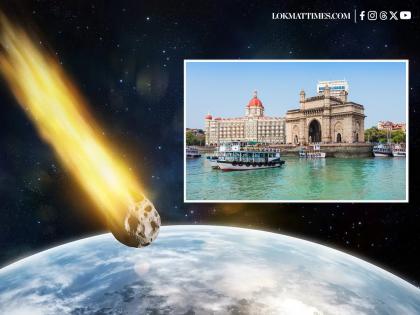Mumbai In Danger? ‘City Killer Asteroid Coming Close To Earth, All You Need To Know
By Lokmat English Desk | Updated: February 21, 2025 16:52 IST2025-02-21T16:51:46+5:302025-02-21T16:52:02+5:30
The astronomers are keeping a keen watch on Asteroid 2024 YR4 from December 2024. There is a 1.5 per ...

Mumbai In Danger? ‘City Killer Asteroid Coming Close To Earth, All You Need To Know
The astronomers are keeping a keen watch on Asteroid 2024 YR4 from December 2024. There is a 1.5 per cent (or 1 in 67) chance of the city killer space rock striking earth during a close flyby on December 22, 2032. As there is a high risk of the asteroid hitting earth, agencies across the world, including NASA, have been closely monitoring its trajectory.
A simulation of the anticipated 2924 YR4 impact corridor has been posted by astronomers. It extends from the eastern Pacific Ocean to South Asia and is based on NASA's assessment, according to Scientific American report. Massive population centres like Mumbai, Bogota, Lagos, Nigeria, and Colombia are included in the region.
Also Read: ‘You Are Slim,’ ‘I Like You’ Messages Sent to Women at Night Are Obscene, Says Mumbai Sessions Court
Here are 70 clones of #asteroid 2024 YR4 that do hit Earth, highlighting the impact risk corridor. There are some big cities along that line: #Bogota, #Lagos, #Mumbai.
— Tony Dunn (@tony873004.bsky.social) 11 February 2025 at 00:38
[image or embed]
There is a small chance of this asteroid striking the moon.
The asteroid is 130 to 300 meters wide. The immediate consequences of an asteroid crash with Earth could be comparable to a detonating hydrogen bomb, causing enough localised destruction to kill any city in its path, regardless of whether the asteroid fragments in our planet's skies or punches a crater into the surface.
But each day the odds of collision decrease. Scientists predict that, like Apophis, it will eventually drop to zero. "At some point in the next months to a few years, the probability will go to zero," the New York Post reported, quoting Bruce Betts, the head scientist at the nonprofit Planetary Society.
Open in app